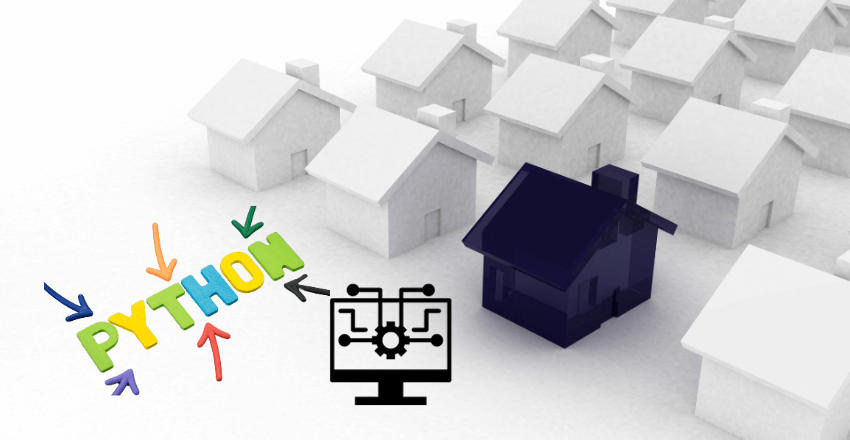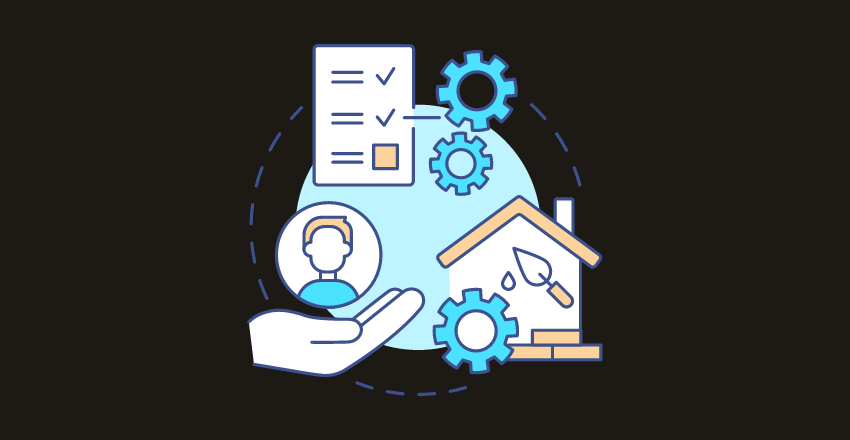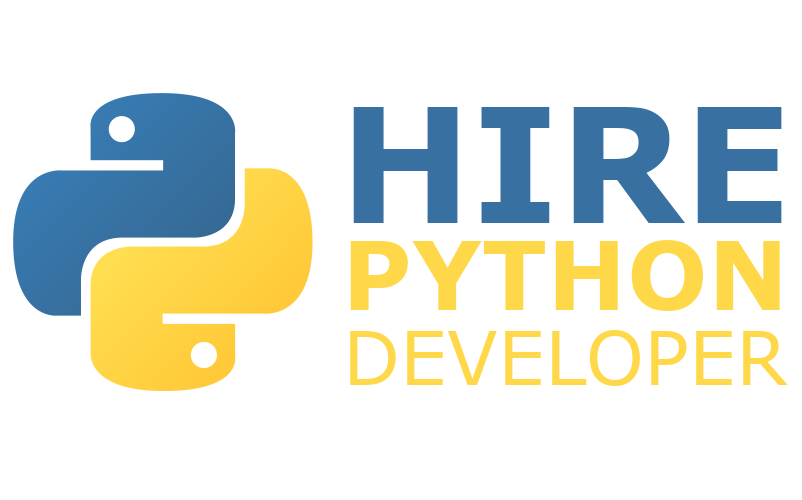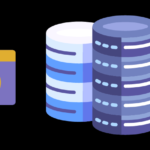 In today’s fast-paced real estate industry, property management tasks can be overwhelming and time-consuming. That’s where Python real estate software comes in. Its advanced capabilities can streamline workflows and make property management more efficient and profitable.
In today’s fast-paced real estate industry, property management tasks can be overwhelming and time-consuming. That’s where Python real estate software comes in. Its advanced capabilities can streamline workflows and make property management more efficient and profitable.
Python real estate software is a powerful tool for building real estate solutions that are specifically tailored to the needs of the industry. Its flexibility and versatility allow for the creation of innovative software that can handle a variety of property management tasks.
Whether you’re managing rental properties, commercial real estate, or any other property type, Python real estate software can simplify your workflows and enhance efficiency. By automating data analysis, integrating with external systems, and enabling customizable workflows, this software can optimize productivity and reduce costs.
Building Real Estate Solutions with Python
Python is a versatile and flexible language that is well-suited for building real estate solutions. With its simple syntax and extensive library of modules, developers can quickly create custom software that meets the specific needs of the real estate industry. Python solutions for real estate can provide efficient and effective property management tools that streamline workflows and increase productivity.
Python’s object-oriented programming style allows for easy integration with other systems and tools, making it an ideal choice for real estate applications. Additionally, Python’s ability to work with large data sets and perform complex calculations makes it a powerful tool for property valuation, market analysis, and investment decision-making.
By leveraging Python’s capabilities, developers can build real estate software that is tailored to the unique needs of their organization. For example, a property management company could use Python to develop a custom tool for tracking tenant information, rent payments, and maintenance requests.
| Code Example – Automated Rent Collection | Code Example – Tenant Management |
|---|---|
| |
Python real estate software can be built using a range of frameworks and libraries, including Django, Flask, and SQLAlchemy. Each framework has its own unique features and advantages, making it important to select the right tool for the job. For example, Django is a powerful full-stack framework that comes with many pre-built features and modules, while Flask is more lightweight and customizable.
When comparing Python to other programming languages like Java or C#, Python offers several advantages for real estate applications. Python has a simpler syntax and is easy to learn, making it ideal for developers with varying levels of experience. Additionally, Python’s library of modules and tools allows for rapid development and customization of real estate solutions.
| Python Code Example – Property Management System | C# Code Example – Property Management System |
|---|---|
| |
Overall, Python real estate software provides agile solutions to streamline property management tasks and optimize workflows. By leveraging Python’s capabilities and selecting the right frameworks and libraries, developers can build customized solutions that meet the specific needs of their organization.
Simplifying Property Management Workflows

Python real estate software is designed to simplify property management tasks and workflows. The software offers a range of features and functionalities that can help you streamline your day-to-day operations. Here are some ways in which Python real estate software can help you simplify your workflows:
Tenant Management
Python real estate software can help you manage your tenants more efficiently. You can use the software to store tenant information, track rent payments, and send reminders to tenants when payments are due. The software can also generate reports on tenant activity, making it easier for you to stay on top of your tenant management tasks.
Rent Collection
Python real estate software can automate your rent collection process. You can set up the system to send automated rent reminder emails to tenants, process payment transactions, and generate rent receipts. With automated rent collection, you can save time and reduce the risk of errors in your financial records.
Maintenance Tracking
Python real estate software can help you keep track of your maintenance tasks. You can use the software to schedule maintenance tasks, assign them to team members, track task completion, and generate reports on maintenance activities. This will help you stay on top of your property maintenance and avoid costly repairs in the future.
Python real estate software can help you simplify your property management workflows. The software is easy to use and can automate many of your daily tasks, freeing up your time to focus on growing your real estate business.
Enhancing Efficiency with Python Real Estate Software
Python real estate software is the key to enhancing efficiency in property management tasks. With its numerous features and functionalities, Python enables users to streamline workflows and automate time-consuming tasks.
One way Python real estate software enhances efficiency is through automated data analysis. The software can quickly process large amounts of data and convert it into visual graphs and charts, making it easier to spot trends and patterns. This ensures that real estate professionals can make data-driven decisions in real-time.
Integration with external systems is another feature that enhances efficiency in Python real estate software. The software can be integrated with other tools, such as accounting systems, to automate processes and reduce manual data entry. This not only saves time but also minimizes the risk of errors and inaccuracies.
Customizable workflows in Python real estate software allow users to tailor the software to their individual needs. This means that workflows can be optimized to suit specific tasks, such as tenant management, rent collection, maintenance tracking, and reporting. As a result, users can work more efficiently, while ensuring accuracy and compliance.
Python real estate software also provides users with real-time access to data, enabling them to make quick decisions and take timely action. This is especially important in the fast-paced world of real estate, where market conditions can change rapidly.
Code Example:
# Automated Data Analysis
import pandas as pd
import seaborn as sns
# Load real estate data
real_estate_data = pd.read_csv('real_estate_data.csv')
# Plot the relationship between price and size
sns.scatterplot(x="size", y="price", data=real_estate_data)
The code above shows how Python can be used to automate data analysis in the real estate industry. The pandas library is used to load real estate data and the seaborn library is used to plot the relationship between price and size. This visualization can help real estate professionals make more informed decisions about pricing and property listings.
Overall, Python real estate software is a powerful tool for enhancing efficiency in property management tasks. Its automated data analysis, integration capabilities, customizable workflows, and real-time access to data make it an indispensable asset for real estate professionals.
Boosting the Bottom Line with Python Real Estate Software
By leveraging the power and flexibility of Python real estate software, property management companies can achieve significant financial benefits. The automation and efficiency provided by Python can save costs, increase revenue, and improve profit margins in real estate operations.
For example, Python real estate software can streamline property management tasks such as rent collection, tenant management, maintenance tracking, and reporting. By automating these workflows, property management companies can reduce staff hours and associated costs, while also increasing accuracy and minimizing errors.
In addition, Python real estate software can provide valuable insights into property data and trends. Through automated data analysis and reporting, companies can quickly identify opportunities for cost savings, revenue growth, and portfolio optimization. These insights can be used to make informed investment decisions and drive financial success.
Industry trends also point to the increasing importance of technology, including Python real estate software, in improving financial outcomes for property management companies. Research shows that companies that invest in technology solutions tend to outperform their peers in terms of profitability and growth.
“Investing in technology solutions has become essential for property management companies looking to stay competitive and drive financial success. Python real estate software provides a powerful and flexible solution for streamlining operations and maximizing profits.”
Comparing Python Real Estate Software to Other Frameworks
Python real estate software provides a range of innovative solutions that streamline property management workflows. However, it is not the only technology available to the real estate industry. To gain a better understanding of how Python compares to other frameworks commonly used in the industry, we’ll explore their advantages and disadvantages.
Python vs. Java
Java is a popular programming language used in real estate software development. It is known for its scalability and stability, making it a reliable choice for large real estate operations. However, compared to Python, Java can be more cumbersome and time-consuming to develop and implement. Here is an example of how Python and Java differ in code implementation:
| Python | Java |
|---|---|
return x + y | sum = num1 + num2; } } |
As you can see, Python code is more concise and easier to read than Java code. Python’s simplicity and ease-of-use make it a more appealing choice for smaller real estate operations.
Python vs. PHP
Another common language used in real estate development is PHP. PHP is often used for web development, making it a popular choice for real estate websites and portals. However, compared to Python, PHP may offer less flexibility in software development. Here is an example of a code difference between Python and PHP:
| Python | PHP |
|---|---|
if num % 2 == 0: return “Even” else: return “Odd” | |
Again, Python code is more concise and easier to read than PHP code. Python’s flexibility and versatility make it a more appealing choice for real estate software development.
While Python may not be the only technology available to the real estate industry, it offers unique advantages over other frameworks. Its simplicity, ease-of-use, and flexibility make it an appealing choice for small to medium-sized real estate operations.
Leveraging Python for Property Solutions

Python real estate software offers unique capabilities for solving property-related challenges. Leveraging Python can help developers create solutions for property valuation, market analysis, and investment decision-making.
One example of leveraging Python for property solutions is the use of data analysis libraries such as Pandas and NumPy. These libraries can help developers analyze large data sets and identify trends in real estate markets. Code examples can be provided to illustrate how these libraries can be used in real estate software development.
Python can also be leveraged to create custom tools for property management tasks. For example, a real estate company could use Python to develop a tool for automatically generating rent invoices and tracking payments. Such a tool could be integrated with other software systems or used as a standalone solution.
In addition, Python can be used to develop predictive models for real estate investment decision-making. By analyzing historical data on property values and market trends, developers can create models that help investors make informed decisions about which properties to buy and when to sell them. Code examples can be provided to demonstrate how Python can be used to create predictive models for real estate investments.
Overall, leveraging Python for property solutions can help developers create innovative and effective software solutions for the real estate industry. By combining the power and flexibility of Python with industry-specific knowledge, developers can create solutions that optimize property management workflows and enhance profitability.
Exploring Python Frameworks for Real Estate Solutions
Python has become a popular choice for developing real estate software solutions due to its flexibility and versatility. There are various Python frameworks available that are specifically designed for building real estate solutions. Here are some of the most popular frameworks:
Django
Django is a high-level Python web framework that follows the model-template-view (MTV) architectural pattern. It is designed for building complex, database-driven websites and applications.
In the real estate industry, Django can be used for developing property search engines, listing management systems, and rental property management platforms. Django’s ORM (Object Relational Mapper) provides a simple way to interact with databases, making it an ideal choice for real estate applications that require extensive data management.
Here’s an example of Django code for defining a model:
from django.db import models
class Property(models.Model):
address = models.CharField(max_length=200)
price = models.DecimalField(max_digits=10, decimal_places=2)
bedrooms = models.IntegerField()Flask
Flask is a micro web framework that is simple, lightweight, and easy to use. It is designed for small to medium-sized applications that do not require complex features or extensive code. In the real estate industry, Flask can be used for developing property listing websites, lead generation systems, and real estate agent portals. Flask’s simplicity and flexibility make it ideal for real estate startups or small businesses that need to build a web presence quickly.
Here’s an example of Flask code for defining a route:
from flask import Flask
app = Flask(__name__)
@app.route('/property/')
def show_property(id):
return 'This is property number %d' % idPyramid
Pyramid is a flexible, open-source web framework that is designed for building both small and large web applications. It emphasizes flexibility, allowing developers to choose the tools and components that best fit their needs. In the real estate industry, Pyramid can be used for developing property management systems, real estate CRM (customer relationship management) software, and home valuation platforms. Pyramid’s modularity and extensibility make it an excellent choice for real estate applications that require customization and scalability.
Here’s an example of Pyramid code for defining a view:
from pyramid.view import view_config
@view_config(route_name='property_detail', renderer='templates/property_detail.jinja2')
def property_detail(request):
property_id = request.matchdict['id']
return {'property_id': property_id}These frameworks and others offer a range of features and capabilities for building real estate solutions with Python. By leveraging the power of Python and these frameworks, real estate businesses can develop custom software solutions that meet their unique needs and challenges in the industry.
Best Practices for Implementing Python Real Estate Software

Implementing Python real estate software requires careful consideration and planning to ensure success. Here are some best practices to follow:
Select a software solution that fits your specific needs: Before investing in a Python real estate software solution, assess your organization’s unique goals and challenges.
| Best Practice | Example |
|---|---|
| Assess your organization’s unique goals and challenges. | Is your primary goal to streamline rent collection or improve tenant communication? Are you looking to optimize maintenance tracking or accounting processes? Identifying your specific needs will help you select a software solution that is tailored to your organization’s goals. |
Ensure proper training and support: While Python real estate software can streamline tasks and improve productivity, it requires some level of technical skill from its users.
| Best Practice | Example |
|---|---|
| Provide adequate training and support for users. | Offer training sessions for your staff to ensure that they have the technical skills necessary to use Python real estate software effectively. Additionally, consult with the software provider to learn about support options in case of technical difficulties or questions during use. |
Integrate with existing technology: Python real estate software can be even more effective when integrated with other systems and technologies currently used by the organization.
| Best Practice | Example |
|---|---|
| Integrate Python real estate software with existing technology. | For example, integrate the software with your accounting software to automatically transfer financial data, or with your tenant communication platform to improve communication with renters. This will optimize your organization’s use of technology and increase the software’s effectiveness in streamlining workflows. |
Regularly update and maintain the software: Python real estate software requires regular maintenance and updates to improve functionality and ensure its continued compatibility with other systems.
| Best Practice | Example |
|---|---|
| Regularly update and maintain the software. | Ensure your staff keeps the software up-to-date with the latest version and security patches. Additionally, regularly check for any compatibility issues with other systems or software used by your organization to ensure seamless operations. |
Implementing Python real estate software using these best practices can lead to streamlined workflows, increased efficiency, and improved profitability for your organization.
Conclusion
Python real estate software offers a wide range of solutions that can streamline property management tasks and boost profitability in the real estate industry. Its flexibility and versatility make it an ideal choice for developing innovative software solutions that cater to the unique needs of the industry.
By simplifying workflows and enhancing efficiency, Python real estate software can lead to cost savings, increased revenue, and improved profit margins. Alongside this, leveraging Python can offer unique capabilities when addressing property-related challenges, providing solutions for property valuation, market analysis, investment decision-making, and other specific real estate tasks.
Furthermore, as trends in Python real estate software development continue to evolve, Python frameworks are becoming increasingly popular for developing real estate solutions. These frameworks offer unique features and advantages that can be leveraged to create efficient and effective software solutions.
As with any implementation, it is important to follow best practices for implementing Python real estate software. By considering factors such as selecting the right software solution, deploying it effectively, and utilizing best practices in Python development, companies can maximize the benefits of Python in real estate operations.
Ultimately, Python real estate software offers a multitude of benefits that can help real estate companies to boost their bottom line and improve their operational efficiency.
By considering Python real estate software, companies can stay ahead of the curve and continue to innovate in the ever-changing real estate industry.
FAQ

Q: What is Python real estate software?
A: Python real estate software is a software solution specifically designed for the real estate industry, utilizing the Python programming language. It provides tools and functionalities to streamline property management tasks, optimize workflows, and enhance efficiency in real estate operations.
Q: What are the benefits of using Python real estate software?
A: Using Python real estate software offers several benefits, including increased efficiency in property management workflows, automation of manual tasks, customizable workflows, integration with external systems, and data analysis capabilities. It can help save time, reduce costs, and enhance profitability in real estate operations.
Q: How can Python real estate software simplify property management tasks?
A: Python real estate software simplifies property management tasks by providing features such as tenant management, rent collection, maintenance tracking, and reporting tools. These functionalities streamline workflows, eliminate manual processes, and improve overall efficiency in managing properties.
Q: Can Python real estate software enhance productivity?
A: Yes, Python real estate software can enhance productivity by automating repetitive tasks, providing data analysis capabilities, and offering customizable workflows. It enables real estate professionals to focus on strategic decision-making and value-added activities, resulting in increased productivity and improved outcomes.
Q: How does Python real estate software contribute to financial success?
A: Python real estate software contributes to financial success by automating processes, reducing costs, and optimizing revenue streams. It can lead to cost savings through streamlined workflows, improved rent collection, and optimized maintenance management. Additionally, it provides data analysis capabilities that help identify opportunities for increased revenue and improved profit margins.
Lydia is a seasoned technical author, well-versed in the intricacies of software development and a dedicated practitioner of Python. With a career spanning 16 years, Lydia has made significant contributions as a programmer and scrum master at renowned companies such as Thompsons, Deloit, and The GAP, where they have been instrumental in delivering successful projects.
A proud alumnus of Duke University, Lydia pursued a degree in Computer Science, solidifying their academic foundation. At Duke, they gained a comprehensive understanding of computer systems, algorithms, and programming languages, which paved the way for their career in the ever-evolving field of software development.
As a technical author, Lydia remains committed to fostering knowledge sharing and promoting the growth of the computer science community. Their dedication to Python development, coupled with their expertise as a programmer and scrum master, positions them as a trusted source of guidance and insight. Through their publications and engagements, Lydia continues to inspire and empower fellow technologists, leaving an indelible mark on the world of scientific computer science.


![15 Most Contributed Python Projects on GitHub [Stats]](https://hirepythondeveloper.com/wp-content/uploads/2024/03/15-Most-Contributed-Python-Projects-on-GitHub-Stats-1-150x150.png)




